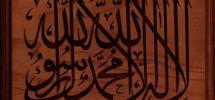Hadhrat Ruqayyah (Radhiyallaho anha): She was born three years after the birth of Hadhrat Zainab (Radhiyallaho anha) when the Prophet Mohammad (Sallallaho Alaihe Wasallam) was 33. She was married to Utbah, son of Abu Lahab, the Prophet Mohammad's (Sallallaho Alaihe Wasallam) uncle, but had not yet started living with him when Soorah Al-Lahab was revealed. Abu Lahab called his sons Utbah and Utaibah (to whom Umme Kulsum, another daughter of the Prophet Mohammad (Sallallaho Alaihe Wasallam) was married, and said to them: “Unless you both divorce the daughters of Muhammed, I am not going to see your faces.” They divorced their wives. Later, upon the fall of Mecca, Utbah embraced Islam. Hadhrat Ruqayyah (Radhiyallaho anha) after this divorce was married to Hadhrat Usman (Radhiyallaho anho). The couple emigrated to Abyssinia twice. Since the Prophet Mohammad (Sallallaho Alaihe Wasallam) had anounced to the Sahabah that he was expecting to recieve Allah's command for emigration to Madinah any time, they started shifting to Madinah even before the Prophet Mohammad (Sallallaho Alaihe Wasallam) Hijrat. Hadhrat Usman (Radhiyallaho anho) and Hadhrat Ruqayyah (Radhiyallaho anha) had also emigrated to Madinah before the Prophet Mohammad (Sallallaho Alaihe Wasallam) arrived in the town. At the time of Badr, Hadhrat Ruqayyah (Radhiyallaho anha) was ill (she died subsequently of this illness). Usman (Radhiyallaho anho) was, therefore, asked by the Prophet Mohammad (Sallallaho Alaihe Wasallam) to stay in Madinah and look after her. The news about the victory in Badr was received in Madinah when people were returning from Ruqayyah’s (Radhiyallaho anha) funeral. The Prophet Mohammad (Sallallaho Alaihe Wasallam) was, therefore, not present at her burial. A son was born to Hadhrat Ruqayyah (Radhiyallaho anha) in Abyssinia. He was named Abdullah and survived his mother, but died in 4 A. H. when he was six years old.
2014-04-18 02:26:16
Hadhrat Ruqayyah
sign in to comment
Be the first to comment





